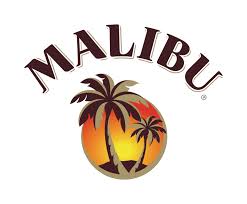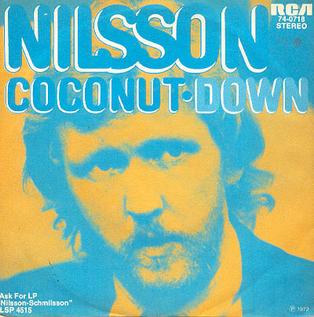Coconut Records may refer to:
- Coconut Records, a musical project by Jason Schwartzman
- Coconut Records, a record label founded by Tony Hendrik
Coconut Records may refer to:

The coconut tree is a member of the palm tree family (Arecaceae) and the only living species of the genus Cocos. The term "coconut" can refer to the whole coconut palm, the seed, or the fruit, which botanically is a drupe, not a nut. The name comes from the old Portuguese word coco, meaning "head" or "skull", after the three indentations on the coconut shell that resemble facial features. They are ubiquitous in coastal tropical regions and are a cultural icon of the tropics.

Tom kha kai, tom kha gai, or Thai coconut soup is a spicy and sour hot soup with coconut milk in Thai cuisine.

Kid Creole and the Coconuts is an American musical group created by August Darnell with Andy Hernandez and Adriana Kaegi. Its music incorporates a variety of styles and influences, in particular a mix of disco and Latin American, Caribbean, and Calloway styles conceptually inspired by the big band era. The Coconuts are a trio of female backing vocalists/dancers, founded and originally choreographed and costumed by Kaegi.

Malibu is a coconut flavored liqueur, made with white rum, and having an alcohol content by volume of 21.0 %. As of 2017 the Malibu brand is owned by Pernod Ricard, which calls it a "flavored rum", where this designation is allowed by local laws.

Coconut water is the clear liquid inside young coconuts. In early development, it serves as a suspension for the endosperm of the coconut during the nuclear phase of development. As growth continues, the endosperm matures into its cellular phase and deposits into the rind of the coconut pulp. The liquid inside young coconuts is sometimes preferred to the liquid of a ripened coconut. Coconut water from young green coconuts is also known specifically as buko juice in Philippine English.

Coconut Fred's Fruit Salad Island! is an American animated television series created by Sammy Oriti and Don Oriolo that aired for two seasons on Kids' WB from September 17, 2005, to May 27, 2006. The show was produced by Warner Bros. Animation with flash animation provided by Dong Yang Animation, Studio B Productions, and Top Draw Animation.

Kerala cuisine is a culinary style originated in the Kerala, a state on the southwestern Malabar Coast of India. Kerala cuisine offers a multitude of both vegetarian and non-vegetarian dishes prepared using fish, poultry and red meat with rice as a typical accompaniment. Chillies, curry leaves, coconut, mustard seeds, turmeric, tamarind, asafoetida and other spices are also used in the preparation.
Creole may refer to:

"Coconut" is a novelty song written and first recorded by American singer-songwriter Harry Nilsson, released as the third single from his 1971 album, Nilsson Schmilsson. It was on the U.S. Billboard charts for 14 weeks, reaching #8, and was ranked by Billboard as the #66 song for 1972. It charted in a minor way in the UK, reaching #42. "Coconut" did best in Canada, where it peaked at #5.
Sa or Saa language is an Austronesian language spoken in southern Pentecost Island, Vanuatu. It had an estimated 2,500 speakers in the year 2000.
Coconut may refer to the coconut palm, or to its fruit or the seed within its fruit.
Coconut Island may refer to:

Fresh Fruit in Foreign Places is the second album by Kid Creole and the Coconuts, released in 1981.

Doppelganger is the fourth studio album by Kid Creole and the Coconuts, released in 1983. The album was a relative commercial and critical disappointment following the group's most popular album Tropical Gangsters/Wise Guy. The album was released on LP and cassette in September 1983 and peaked at #21 in the UK, and to moderate success throughout Europe but did not chart in the US. The album includes the singles "There's Something Wrong in Paradise", "The Lifeboat Party", and in the US "If You Wanna Be Happy". It was reissued by Universal Island Records with bonus tracks added to album in 2002.

The coconut crab is a terrestrial species of giant hermit crab, and is also known as the robber crab or palm thief. It is the largest terrestrial arthropod known, with a weight of up to 4.1 kg (9 lb). The distance from the tip of one leg to the tip of another can be as wide as 1 m. It is found on islands across the Indian and Pacific Oceans, as far east as the Gambier Islands, Pitcairn Islands and Caroline Island and as far south as Zanzibar. While its range broadly shadows the distribution of the coconut palm, the coconut crab has been extirpated from most areas with a significant human population such as mainland Australia and Madagascar.

Ohn no khao swè is a Burmese dish consisting of wheat noodles in a curried chicken and coconut milk broth thickened with gram flour. The dish is often garnished with crisp fried bean fritters, sliced raw onions, chillies, crisp noodles, and slices of hard-boiled egg, and zested with lime or lemon juice and fish sauce.

Coconut production contributes to the national economy of Sri Lanka. The scientific name of the coconut is Cocos nucifera. Sri Lanka there are three varieties, tall variety, dwarf variety and King coconut variety. According to figures published in December 2018 by the Food and Agriculture Organization of the United Nations, it is the world's fourth largest producer of coconuts, producing 2,623,000 tonnes in 2018.

Coconuts falling from their trees and striking individuals can cause serious injury to the back, neck, shoulders and head, and are occasionally fatal.
Zico is a brand of coconut water and other drinks containing coconut water. The drinks are produced by Zico Rising, originally founded as Zico Beverages in 2004.

Tubâ is a Filipino alcoholic beverage created from the sap of various species of palm trees. During the Spanish colonial period, tubâ was introduced to Guam, the Marianas, and Mexico via the Manila Galleons. It remains popular in Mexico, especially in the states of Colima, Jalisco, Michoacán, Nayarit, and Guerrero. Tubâ was also introduced to the Torres Strait Islands of Australia in the mid-19th century by Filipino immigrant workers in the pearling industry.